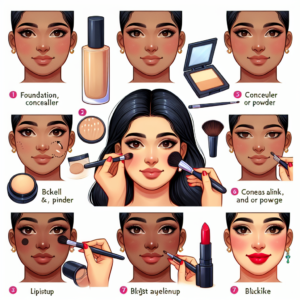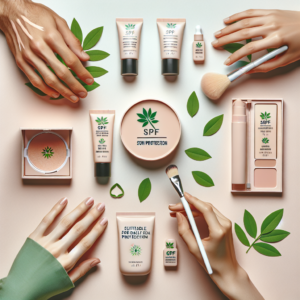
When it comes to makeup, we’re not just painting our faces; we’re investing in our skin’s future. The buzz around organic makeup has grown louder in recent years, and for good reason. As we become more conscious of what we put on our skin, organic makeup is stepping into the spotlight, promising beauty without compromise. But is it truly worth the hype? Let’s dive into the world of organic makeup and see if it lives up to its claims.
Key Takeaways
-
Organic makeup often contains skin-nourishing ingredients and is free from harsh chemicals.
-
Certifications like USDA Organic and ECOCERT provide assurance of a product’s organic status.
-
Brands like Juice Beauty, RMS Beauty, and Ilia are leading the organic makeup movement with high-quality products.
-
Organic makeup can benefit sensitive skin types and support environmental sustainability.
-
Transitioning to organic makeup involves understanding your skin’s needs and choosing products with the right certifications.
Decoding the Appeal of Organic Makeup
What’s the big deal with organic makeup? Think of it as the clean-eating movement, but for your face. Just as you’d prefer fresh, pesticide-free vegetables, organic makeup offers a purer form of beauty. It’s crafted with ingredients that are not only safe for your skin but also ethically sourced and environmentally friendly. This holistic approach to beauty is what makes organic makeup a choice for those looking to make a positive impact on both their skin and the planet.
Comparing Organic vs. Traditional Makeup
Let’s break it down: traditional makeup is often packed with synthetic ingredients, some of which can cause skin irritation or long-term health concerns. On the flip side, organic makeup is formulated with natural components, minimizing the risk of adverse reactions. Besides that, organic makeup tends to be gentler on the skin, making it a go-to for those with sensitive complexions.
Understanding Organic Certifications and Labels
Navigating the organic makeup market can be tricky. With terms like ‘natural’ and organic thrown around, it’s essential to know what to look for. Certifications are your best friend here. When you see a USDA Organic or ECOCERT label, you’re looking at a product that meets strict standards. This means you’re getting makeup that’s made with a significant percentage of organic ingredients and without harmful chemicals.
The True Value of Organic Ingredients
It’s not just about avoiding the bad stuff; it’s about embracing what’s genuinely good for your skin. Organic makeup often includes ingredients like jojoba oil, aloe vera, and shea butter, which provide hydration and have natural healing properties. These ingredients aren’t just filler; they’re active, beneficial components that help nourish and protect your skin.
Benefits for Skin Health and the Environment
-
Organic makeup can improve skin health by using ingredients that are less likely to cause irritation.
-
By avoiding synthetic chemicals, organic makeup reduces the environmental impact, supporting a healthier planet.
-
Choosing organic makeup supports ethical practices, including cruelty-free testing and fair trade sourcing.
Most importantly, the benefits of organic makeup extend beyond your complexion. By choosing products that are sustainably produced, you’re casting a vote for environmental and ethical practices in the beauty industry. It’s a small but powerful way to contribute to positive change.
Spotlight on Key Ingredients and Their Advantages
Organic makeup isn’t just about what’s left out; it’s also about what’s put in. Ingredients like coconut oil, which hydrates and repairs skin, and green tea extract, known for its powerful antioxidants, are staples in organic formulations. These ingredients are not only kinder to your skin but also to the environment as they are sourced through sustainable practices.
Take for instance, rosehip oil, celebrated for its healing properties and rich in vitamins A and C. It’s often found in organic makeup and can help reduce fine lines and hyperpigmentation. These natural ingredients are not only effective but also provide a sensory experience that’s unmatched by synthetic alternatives.
“When you choose organic makeup, you’re not just applying color to your face, you’re feeding your skin with nutrients that help it thrive.” – A notable shift from traditional makeup.
Trusted Organic Makeup Brands
Juice Beauty: Stellar Performance With Nature’s Touch
Leading the pack in organic beauty, Juice Beauty offers a range of products with certified organic ingredients. They’re known for their commitment to purity and performance, with items like their Phyto-Pigments Flawless Serum Foundation that delivers a smooth finish while nourishing the skin.
RMS Beauty: Eco-Conscious Beauty That Delivers Results
RMS Beauty is another favorite, priding itself on using raw, food-grade organic ingredients. Their “Un” Cover-Up concealer not only covers imperfections but also helps heal the skin, thanks to its coconut oil and cocoa seed butter content.
Ilia: Innovative Formulas Rooted in Purity
Ilia has gained a cult following for their clean formulas that don’t sacrifice color payoff. Their True Skin Serum Foundation is a testament to their philosophy, offering a blendable and buildable coverage that also soothes and tones the skin.
Vapour Organic Beauty: Ethical Practices Meet High-Quality Aesthetics
Vapour Organic Beauty stands out for their artisanal approach to makeup. Their products, like the Atmosphere Luminous Foundation, use organic and natural ingredients to enhance your natural beauty while being kind to the planet.
Alima Pure: Timeless Elegance from Organic Sources
Alima Pure proves that you can have luxurious makeup without the guilt. Their Satin Matte Foundation provides a natural, long-wearing finish and is made with only the purest ingredients, including mica and iron oxides for natural color.
Product Showcase: Organic Makeup Must-Haves
Now that we’ve highlighted some of the best brands, let’s talk about the products that should be on your radar. These are the organic makeup must-haves that deliver on their promises and have earned a place in the hearts of beauty lovers.
Top Organic Foundation for Flawless Skin
The key to a perfect makeup look is a flawless base, and organic foundations are up to the task. Juice Beauty’s Phyto-Pigments Flawless Serum Foundation is a top pick for its skin-perfecting properties and natural finish.
Nourishing Organic Lipsticks for Vibrant Smiles
Lipsticks are a daily essential for many, and opting for an organic option like Ilia’s Color Block Lipstick means you’re applying something safe enough to eat. With rich pigments and moisturizing ingredients, these lipsticks make a statement while caring for your lips.
Eyeshadows: Rich Pigment, Pure Ingredients
For eyeshadows, it’s all about pigment and staying power. RMS Beauty’s Eye Polishes offer both, with a selection of shades that can take you from day to night, all while being gentle on the delicate eye area.
Mascaras: Lush Lashes the Organic Way
And let’s not forget about lashes. Vapour Organic Beauty’s Mesmerize Mascara coats lashes in rich color and conditions them with a blend of organic oils, making it a standout in the organic beauty scene.
Consumer Favorites: Organic Makeup That Lives Up to the Hype
It’s one thing for brands to tout the benefits of their products, but what do the consumers think? After all, the proof is in the pudding—or in this case, the makeup application.
User Review Spotlight: Real Testimonials
Real people, real results. Users rave about the performance of organic makeup. For example, many have found that switching to Juice Beauty’s foundation has not only improved the look of their makeup but also the health of their skin over time.
Products with the Best Feedback and Repeat Purchase Rates
Products like Alima Pure’s Satin Matte Foundation and Ilia’s True Skin Serum Foundation consistently receive high praise for their natural look and feel. They’re not just one-time purchases; they’re staples in beauty routines.
Applying Your Organic Makeup Like a Pro

Transitioning to organic makeup doesn’t mean you have to compromise on technique. In fact, you might find that these natural formulas blend even more seamlessly into the skin.
Tips for Getting the Most out of Organic Formulas
-
Start with a clean, moisturized face to ensure a smooth application.
-
Use less product than you think you need—organic makeup often has a richer pigment.
-
Blend, blend, blend! Organic makeup is designed to work with your skin, not against it.
Application Techniques for Long-Lasting Beauty
For foundation, apply thin layers and build up coverage as needed. When it comes to eyeshadow, use a primer to enhance the color and longevity. And for lipsticks, prep your lips with a scrub and balm for the perfect canvas.
Your Guide to Switching to Organic Makeup
Making the switch to organic makeup is a journey, but it’s easier than you might think. Start by replacing products as you run out with organic alternatives. Soon, you’ll have a makeup bag that’s good for you and the earth.
Creating a Seamless Transition Strategy
Begin with products that sit on your skin the longest, like foundation and concealer. As you transition, pay attention to how your skin responds and adjust your choices accordingly.
Working with Your Skin’s Needs
Remember, everyone’s skin is unique. What works for one person might not work for another. Listen to your skin, and choose products that address your specific concerns, whether it’s hydration, coverage, or sensitivity.
Tips for Getting the Most out of Organic Formulas
Organic makeup can be a game-changer for your skin, but it’s important to know how to use it effectively. First, always start with a clean, moisturized face to create the perfect canvas. Since organic makeup often contains highly concentrated pigments, a little goes a long way—so use sparingly and build up as needed. And don’t forget to blend! Organic formulas are designed to meld seamlessly with your skin for a natural, radiant finish.
Application Techniques for Long-Lasting Beauty
For foundation, dab small amounts on your face and blend outwards for even coverage. If you’re using a powder, tap off the excess before applying to avoid caking. Organic eyeshadows often work best when patted onto the eyelid rather than swept across—this helps to pack on the pigment and reduce fallout. For lipsticks, apply a thin layer, blot, and then apply a second layer to ensure long-lasting wear. Remember, good tools are just as important as good products, so invest in quality brushes for the best application.
Your Guide to Switching to Organic Makeup
If you’re ready to make the switch to organic makeup, it’s easier than you think. Start by replacing items that you use most frequently or that are closest to running out. This gradual approach is budget-friendly and gives your skin time to adjust. Plus, it’s an opportunity to research and find the products that will work best for you.
Creating a Seamless Transition Strategy
Focus first on products that have the most impact on your skin’s health, such as foundation and concealer. Once you’ve found organic versions that you love, move on to eye makeup and lip products. And don’t forget to check expiration dates—organic makeup often has a shorter shelf life due to the lack of preservatives.
Working with Your Skin’s Needs
Your skin is unique, and what works for someone else might not work for you. If you have sensitive skin, look for organic makeup that’s fragrance-free and hypoallergenic. For oily skin, seek out products with natural mattifying ingredients like bamboo powder. Dry skin types will benefit from creamy, hydrating formulas enriched with oils and butters. Pay attention to how your skin responds and adjust your choices accordingly.
FAQs: Everything You Need to Know About Organic Makeup
Still have questions about organic makeup? Here are some answers to common queries that can help guide your decisions and ensure you’re making the best choices for your beauty routine.
How Do I Verify the Authenticity of Organic Makeup?
To verify the authenticity of organic makeup, look for certifications from recognized organizations like the USDA Organic, ECOCERT, or COSMOS. These labels indicate that a product meets strict standards regarding ingredient sourcing, formulation, and manufacturing processes. Also, be wary of vague terms like ‘natural’ or ‘green’ without certification, as these are not regulated and can be misleading.
Can Organic Makeup Provide the Same Results as Conventional Brands?
Absolutely! Organic makeup has come a long way and now offers the same, if not better, performance as conventional brands. With advancements in green chemistry and a better understanding of how natural ingredients work, organic makeup can deliver stunning results without compromising on quality or efficacy.
Is Organic Makeup Suitable for All Skin Types?
Yes, organic makeup can be suitable for all skin types. It’s especially beneficial for those with sensitive or allergy-prone skin, as it’s free from many irritants found in traditional makeup. However, as with any product, it’s important to patch test and ensure that you’re not allergic to any natural ingredients.
What Is the Shelf Life of Organic Makeup?
Organic makeup typically has a shorter shelf life than traditional makeup due to the absence of synthetic preservatives. Most organic products will have a shelf life of 6 to 18 months, depending on the ingredients and packaging. Always check the expiration date and look for changes in color, smell, or texture as indicators that a product may be past its prime.




